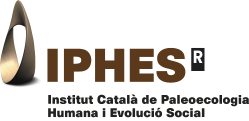NewsNext Previous
The IPHES hosts a symposium between Israeli and Catalan researchers on the origin, evolution and use of the first human technologies
- It will take place from the 5th to the 7th of May and has been made possible thanks to one out of only 10 grants accorded by the Generalitat for research activities between Catalonia and Israel
- It aims to promote a new research network in human evolution between the parties
- It will be an excellent opportunity for Israeli researchers to get to know better the IPHES research center
Program – Photos – català – español
Knowing the origins of the raw materials used by early hominins that created stone tool technology, as well as understanding the uses and evolution of these objects, is at the center of debates about human evolution that are raising much interest today. In this sense, both in Catalonia and in Israel, there are groups working on key sites that may provide evidence to help to resolve these issues. This is the case of IPHES (Institut Català de Paleoecologia Humana I Evolució Social) who received one of only 10 grants awarded in 2014 by the Government of Catalonia to organize symposia between and Catalan and Israeli researchers and to develop projects in common on an international level.
Hence arose the symposium: The Evolution of Raw material use – evidence from the Pleistocene of Africa and western Eurasia, which will take place at IPHES from the 5th to the 7th of May, organized in collaboration with the Institute of Archaeology of The Hebrew University of (HUJ). The aim is to promote cooperative research between IPHES-URV, located in Tarragona, and HUJ and other collaborating Israeli institutions.
But this relationship has some experience already. In the last five years, both institutions have intensified scientific exchange through seminars, conferences, exchange of researchers, Israeli students participating in Catalan excavations, student mobility, etc. In this manner, the Symposium could contribute to building an even stronger research network between Israeli and Catalan scientists. The meeting will also be an excellent opportunity to present IPHES and the hosting city of Tarragona to Israeli guests.
Lines of Research
14 researchers will be taking part in the Symposium; 7 from Israel and 7 from Catalonia. Both the Israeli and IPHES-URV researchers have lines of research in Africa and Eurasia. The institutions excavate and analyze from a multidisciplinary point of view the stone tools made by hominins, covering a timespan from 2.5 million years ago to around 200,000 years. The aim is to better understand the behavior of these hominins.
Typology
Participants will present results from their latest studies on stone tools, their types and uses, and their evolution over time. In this way, they will find synergies between Israeli and Catalan teams that will be the basis for new lines of research between the institutions, with the contribution of both veteran investigators and young students who want to dedicate themselves to research.
Among the key questions that researchers are trying to answer: how and when the hominins that were the authors of the oldest tools of humankind occupied different regions of the Earth, defining their technologies and how and why they were used. In this context, some of the sites under consideration include Barranco León and Fuente Nueva 3 in Orce (Granada), where IPHES has developed a major research project.
Indeed, participants will have the opportunity to consult important collections of stone tools that are in IPHES, such as Orce, between 1.3 and 1.4 million years old, as well as Gran Dolina (Atapuerca, Burgos) and Barranc de la Boella (La Canonja), between 800,000 years and one million years old. Barranc de la Boella is one of two sites in the area of Tarragona that the participants will visit, along with the Cansaladeta (La Riba).
The promotion of international relations
The Symposium was made possible thanks to financial aid for the holding of such joint initiatives between Catalonia and Israel – Joint Symposia (SymIL) awarded by the Direcció General de Recerca del Departament d’Economia i Coneixement (DEC ). The program is based on fostering partnerships between research groups from the two regions to promote strong relationships and develop strong links to advance knowledge transfer and commercialization of research results. It has the support of the Agència de Gestió d’Ajuts Universitaris i de Recerca (AGAUR), whose latest call has provided aid for only 10 symposia, this one at IPHES being one of them.
City tour
In Tarragona, IPHES has also received the support from the City Council (patron of this research center), who will offer a reception for participants to the Symposium in the Jaume I courtyard of the City Hall, as well as guided tour of the Roman and Medieval city of Tarragona.



